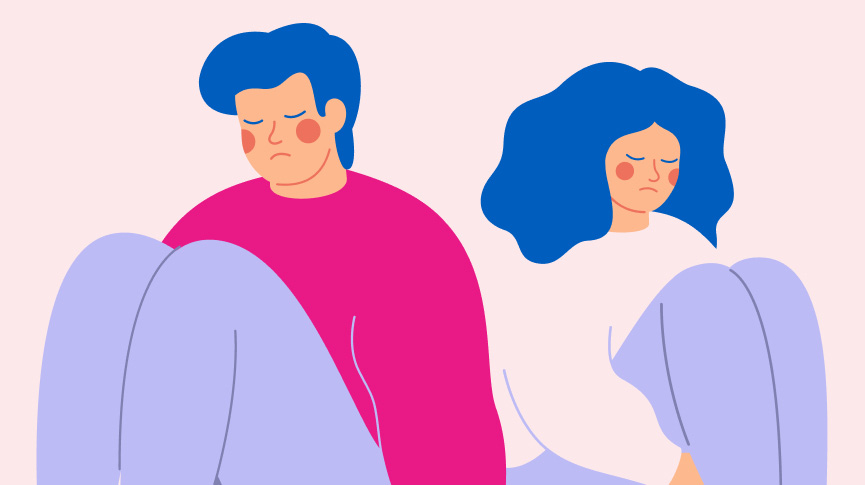Can Your Vagina Get Depressed?

In that infamous Sex and The City scene, Charlotte visits the gynecologist and receives a diagnosis that her “vagina is depressed.”
“I have an entire file of women all with the same symptoms, itching, stinging, burning. It could be vulvodynia,” says her nonchalant gynecologist after confirming it’s not an yeast infection and not a serious condition.
“It’s mostly just uncomfortable,” she says, proceeding to prescribe her a light antidepressant.
“But I’m not depressed,” exclaims Charlotte, aghast.
“It’s not for you. It’s for your vagina.”
Very few scenes in pop culture have had such an enormous impact on millennial women on the way they view their vaginas. The scene poses more questions than it answers: Can vaginas get depressed? Do they need antidepressants? Is this something I should be worried about?
If you have such burning questions (though hopefully not because of a burning vagina like Charlotte), read on to get some answers about vulvodynia, just what was going on in that scene, and some natural ways to perk up a so-called “depressed” vagina.
The Simple Answer Is No
Depression is a kind of mood disorder that impacts the way somebody goes through their daily lives, and while your vagina may feel like a whole other creature sometimes (especially during that time of the month), it’s not a person so it can’t technically get “depressed.” However, mental health fluctuations such as stress, anxiety, and depression can affect blood flow to the vagina and cause symptoms like vaginal dryness and sexual dysfunction. On the flip side, having sexual dysfunction or pelvic pain can also impact your mood and potentially cause depression, especially if you have a history of the disorder. If you are experiencing these symptoms, you should speak to your healthcare provider.
The closest thing to a “depressed vagina” is what Charlotte’s gynecologist mentions on the show – a condition known as vulvodynia. OB-GYNs do often prescribe light antidepressants to treat vulvodynia because it can reduce the pelvic pain caused by the condition. That specific Sex and The City episode where Charlotte’s OB-GYN prescribed her “vagina” antidepressants to help with her pelvic pain clearly stuck around with a generation of women, perhaps because chronic vulvar pain may be the result of depression and mental health issues like depression and anxiety may impact sexual function, though the two aren’t always related.
But… You Could Have Vulvodynia
As we mentioned above, the symptoms Charlotte was experiencing match up to a condition called vulvodynia. Vulvodynia is a condition where the patient experiences long-term discomfort or pain around their vulva (the outer part of the female genitals) for a minimum of three months with no specific cause. For some sufferers, vulvodynia can be so severe that it can be too uncomfortable to have sex or even to sit for long periods of time. Patients often describe the pain as:
- Irritation
- Burning
- Rawness
- Stinging
- Soreness
- Sharp, jabbing pains
- Aching
- Swelling
- Throbbing
The irritation and burning may cause patients like Charlotte to confuse vulvodynia with yeast infections, though the condition is not caused by bacteria, infection, and also cannot be sexually transmitted. Sometimes the disorder may last years.
Symptoms and their intensity varies from person to person – some people may be in constant pain, and others may only experience occasional flare-ups when the vulva is stimulated. Most of the time, the vulva doesn’t appear different than normal, though sometimes the tissue of the vulva may look slightly swollen or inflamed.
Vulvodynia typically comes in two kinds: Generalized vulvodynia, which is when you feel pain throughout the entire vulva area, and localized vulvodynia, which is when the pain flares up in a specific area, such as the opening of the vagina. Localized vulvodynia is more common than generalized vulvodynia.
If you experience pain in your vulva, it’s important to consult with a healthcare provider like your gynecologist who can check if there is another treatable underlying condition causing your pain. Some common conditions that may cause pain in the vagina include:
- STDs like herpes
- An active bacterial or yeast infection
- Vulvar growths
- An inflammatory skin condition, potentially exacerbated by pubic hair grooming or products
- Genitourinary syndrome of menopause
Masturbation Can Help
While vulvodynia is still not entirely understood, it may be compounded by psychological factors like stress. Moreover, it is common for women who have vulvodynia to “press through the pain” and continue to have sex, which may exacerbate the symptoms and cause reflexive tension during sex. Treatment options for vulvodynia include:
- Pelvic floor exercises to “retrain” the brain and muscles
- Cognitive behavioral therapy
- Electrical stimulation
- Medications such as hormonal creams, antidepressants, inhibitors, and anesthetics
One way to help both you and your vagina feel better is masturbation. Masturbation may also help relieve tension and help you relearn the way your vagina works; plus it releases pleasure-inducing endorphins and other hormones in the body that aid with relaxation. Orgasms may act as a natural painkiller, and one recent study published in the Journal of Sexual Medicine found positive associations between masturbation and managing vulval pain.

Clara Wang is a freelance writer based in Nashville, TN but often found abroad. She mostly muses about the three best things in life: Food, sex, and music. Her work has been featured in publications such as Eater Austin, Eater Nashville, Giddy, Buzzfeed, Refinery29, the Austin Chronicle, the Austin American Statesman, and the Daily Dot.


